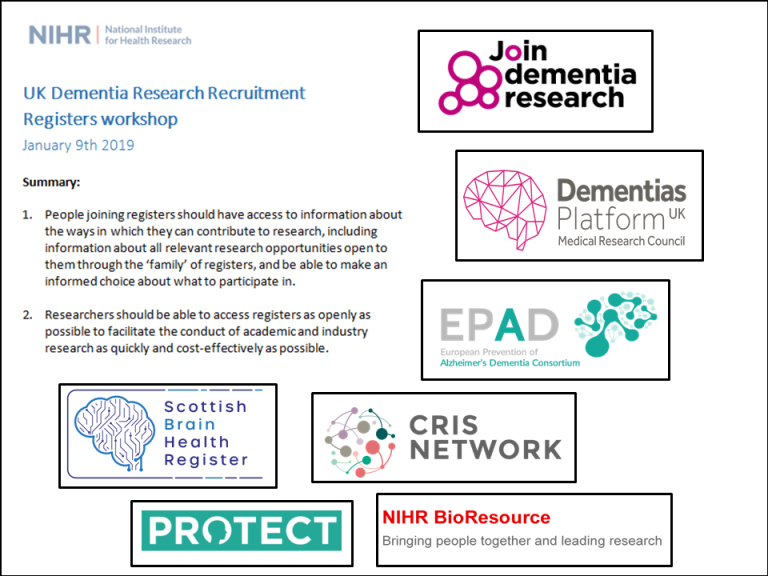UK Dementia Research Recruitment Registers workshop
9 January 2019

Since the publication of the government's ‘Challenge on Dementia’[1]there has been significant investment in initiatives to support identification and recruitment of participants for research studies. This has undoubtedly increased UK research capacity. But there remains a need to increase further our capabilities to: provide more opportunities for people to participate in research; support more effective delivery of academic and industry research, and; increase inward investment from the global life sciences industry.
On January 9th, NIHR convened an expert group including Alzheimer’s Research UK, Alzheimer’s Society and Alzheimer Scotland, and bringing together people responsible for existing registers, with patient, researcher and industry representatives. The purpose of the workshop was to: review existing dementia registers; explore opportunities to maximise their value through increased collaboration, and; identify any gaps in meeting the requirements of current and upcoming research.
The group agreed two principles to guide future register developments:
- People joining registers should have access to information about the ways in which they can contribute to research, including information about all relevant research opportunities open to them through the ‘family’ of registers, and be able to make an informed choice about what to participate in.
- Researchers should be able to access registers as openly as possible to facilitate the conduct of academic and industry research as quickly and cost-effectively as possible.
Following a review of available data on the relative strengths and weaknesses of seven registers, it was noted that few overlaps exist between them in terms of the populations covered or the core purpose of the registers[2]. However, a gap identified related to the delivery of social care research. This will be explored further. Key opportunities identified to optimise the value of current infrastructure included developing consolidated communications and entry pathways into registers for both registrants and researchers. In Join Dementia Research[3] there is already a suitable brand under which consolidated communications should be developed. There is an immediate opportunity to deliver on ‘principle 1’ by bilateral signposting between JDR and each of the other registers. It was agreed that this should be implemented by all registers as soon as possible. In the medium term, the implementation of ‘JDR2’ which is currently being considered provides the opportunity to consolidate entry pathways into registers and deliver on ‘principle 2’.
It was agreed that the group would meet again to develop further partnership working and collaboration.
[2] Registers review were: Bioresource, the proposed Dementias Platform UK Clinical Studies Register, the European Prevention of Alzheimer’s Disease (EPAD) registry, Join Dementia Research (JDR), PROTECT, the Scottish Brain Health Register and UK-CRIS,
 Close
Close

